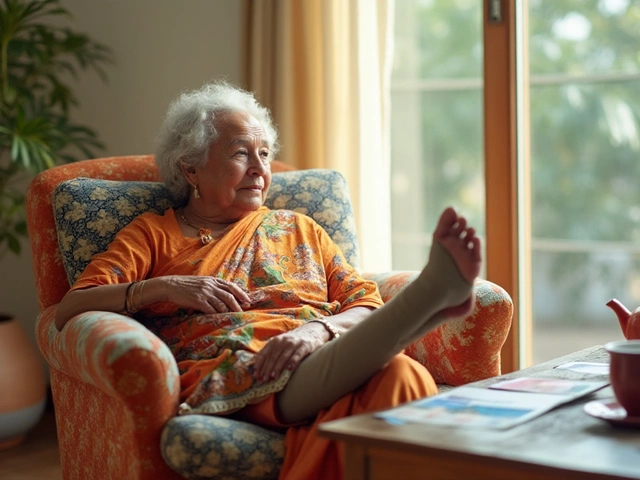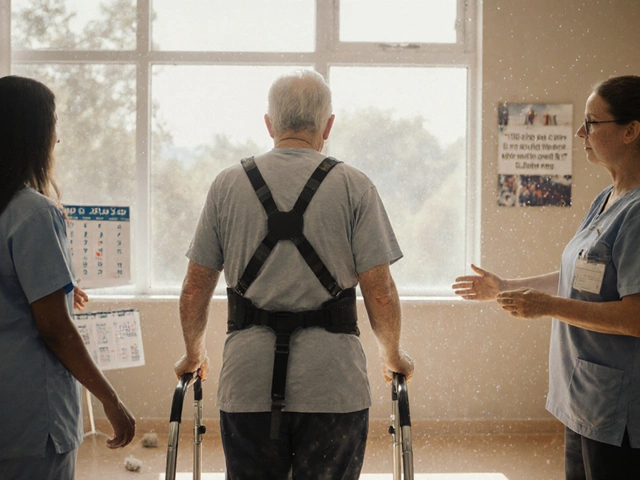There’s this rumor that doctors suddenly refuse to replace your knee past a certain birthday. Honestly? That just isn’t true. Age alone rarely shuts the door on knee surgery. Surgeons almost always care much more about someone’s health and lifestyle than what the calendar says.
Think about it: I’ve seen people in their late 70s or even 80s bounce back after surgery, dropping their cane and feeling like they got part of their life back. But at the same time, I’ve met folks a decade younger who simply aren’t surgical candidates because of major heart or lung problems. The cutoff? It changes from person to person—there’s no magic number.
- What Age Is Considered Too Old?
- How Health Matters More Than Birthdays
- Risks and Recovery for Seniors
- What Doctors Actually Look At
- Tips for Older Adults Considering Surgery
What Age Is Considered Too Old?
Ask 10 people what age is “too old” for knee replacement, and you’ll probably get 10 different answers. Most surgeons won’t set a hard age limit, and a lot of bigger hospitals around the world have done joint replacements for folks well into their 80s and even 90s. The idea of shutting the door on surgery just because someone turned 75? That’s pretty outdated thinking these days.
Back in the 1980s and 90s, many doctors did worry about doing these surgeries on older adults. The tools, anesthesia, and aftercare weren’t what they are now. But today, things look very different. If you check the American Academy of Orthopaedic Surgeons guidelines, they’ll say it’s your overall health, not your age, that decides if you’re a good candidate.
Let’s see what the numbers look like. Here’s data from 2023 about the real ages of people getting knee replacements in the US:
| Age group | % of knee replacements |
|---|---|
| Under 55 | 6% |
| 55–64 | 23% |
| 65–74 | 49% |
| 75–84 | 19% |
| 85 and older | 3% |
That’s right—around one in five knee replacements is done for someone between 75 and 84. Even in the 85+ age bracket, surgeries still happen. Sure, not everyone in that group is a candidate, but the point is: age by itself is rarely the main factor when it comes to knee replacement surgery.
One tip? If you’re over 70 and thinking about it, bring up every health issue—even stuff that feels minor—when you talk with the surgeon. They’ll want the full picture to keep you as safe as possible. Family can help with this, too. My dad was 80 when he got his second knee done, but he and my mom kept his doctor in the loop about every ache, medication, and allergy. It made a big difference during recovery.
So, to sum it up: There’s no set “stop” sign for knee surgery based on age. Surgeons are way more interested in how fit you are, how well you’ll bounce back, and what else is going on with your health. If you’re motivated and your doctor thinks you’re strong enough, you’re probably in the running—gray hair and all.
How Health Matters More Than Birthdays
There’s a reason doctors don’t ask for your age first when you talk about a knee replacement. They’re way more interested in your health checklist than your birth certificate. Take diabetes or heart disease—these matter a lot. If you’ve got your blood sugar under control, or your heart works well enough, you could be a better surgery candidate at 80 than someone much younger whose health is a wreck.
You'll probably get a full-body check-up before surgery is even discussed. The doctor will look at your blood pressure, how your lungs work, your weight, and even talk with your other health specialists. They’ll also rule out any major infections or wound healing problems. Strong bones? That’s on the list too, since your bones need to hold the new knee steady.
Here's the thing many people miss: being active before surgery helps big time. Walking, swimming, or just staying on the move keep your muscles ready for recovery. It’s not about running a marathon—it’s about keeping your legs and heart in good shape. If you sit around all day and never get on your feet, your recovery might be tougher no matter how old you are.
Some hospitals even run special programs for older patients to get them in fighting shape before a procedure. Think of it as “pre-hab”—physical therapy before the real rehab. This can lower the risk of complications and speed up your recovery later.
So, the takeaway? If you’re thinking about surgery for your knee, focus on your overall health. Age might shape the conversation, but it definitely doesn’t call the final shot.

Risks and Recovery for Seniors
Going through knee replacement surgery when you’re older carries a few extra things to think about. Seniors can face a higher risk for some problems, mostly because other health issues—like diabetes or heart disease—get more common with age. But don’t let that scare you off. Doctors have gotten really good at managing these risks, and the safety record for older adults looks better now than it did even a decade ago.
Let’s talk numbers. According to the American Academy of Orthopaedic Surgeons, over 20% of knee replacements in the U.S. are done in patients older than 80. Most people—even in their late 70s and 80s—recover well, but here’s how the risks stack up:
| Risk | Chance in Seniors |
|---|---|
| Blood clots | 2-5% |
| Infection | 1-2% |
| Delayed healing | 10-15% |
| Serious complications (heart or lung) | Under 5% |
Recovery for seniors might take a little longer, but that doesn’t mean it’s impossible. Most are up and moving with a walker the day after surgery. Doctors aren’t looking for Olympic athletes—just steady progress. Sometimes rehab takes an extra month or two compared to younger folks, but the main obstacle is usually building back confidence, not age itself.
Here’s what helps older adults heal up faster:
- Start a little strength training before surgery if possible (simple chair exercises work)
- Arrange for some help at home the first couple of weeks—think meals, rides, or bathing
- Stick to the physical therapy, even when it feels slow
- Watch for signs of infection or pain that’s suddenly worse, and call your doctor right away
Bottom line: risks are real, but most doctors agree that the boost in quality of life after a successful knee replacement often outweighs the downsides, even for people pushing 80 or beyond. The right preparation and a realistic plan make all the difference.
What Doctors Actually Look At
If you’re thinking doctors make decisions about knee replacement just based on age, think again. It’s not your birth year—they check a whole list of things to decide if surgery’s a good idea or not.
Here’s what usually matters most in the real world:
- Overall health: Docs look at how well your heart, lungs, and kidneys are working. If you’ve got conditions like uncontrolled diabetes or severe heart trouble, those might stand in your way more than your age.
- Mobility and pain level: If daily activities like walking, climbing stairs, or even getting up from a chair are getting seriously tough, and pain medicine’s not helping, that’s a big green flag for surgery.
- Weight: Your body weight and BMI aren’t dealbreakers by themselves, but a higher BMI can make surgery riskier. Extra weight puts more stress on the new joint and can slow recovery.
- Bone quality: Thin, weak bones (osteoporosis) may affect which implants can be used—and sometimes call for extra planning but don’t always rule you out.
- Home situation: Docs want to know you have enough support at home after surgery or access to rehab. People who live alone may need some extra planning to keep recovery smooth.
Doctors often check out these things with some basic tests, like blood work, EKGs, or even a chest X-ray. If you have a lot of health issues, you’ll likely see other specialists (like a heart doc) before getting a date on the surgery calendar.
| Factor | Why It Matters |
|---|---|
| Heart Health | Conditions like heart failure or arrhythmia can make surgery unsafe |
| Diabetes | Poorly controlled blood sugar ups risk for infection and slow healing |
| Smoking | Makes it harder for wounds to heal after surgery |
| Mobility | More limited movement usually means higher need for surgery |
| Support System | Helps with recovery and sticking to rehab |
There isn’t an upper age limit set by hospitals—even people over 90 have gotten new knees if they meet all the other criteria. Bottom line: docs want to know you’re healthy enough to get through surgery and strong enough to keep yourself moving afterward. That’s what matters way more than candles on the birthday cake.

Tips for Older Adults Considering Surgery
If you’re past 65 and knee pain is making life tougher, it’s natural to wonder if knee replacement is right for you. Here’s what actually helps older adults get the best results from surgery—and how to set yourself up for a smoother journey.
- Don’t fixate on age: As long as you’re in decent overall health, age alone usually isn’t a roadblock. What matters more is how active you want to be and whether pain is ruining your daily life.
- Get a full health check: Heart disease, diabetes, and breathing problems can raise surgical risks. Schedule a physical, get your blood pressure checked, and ask your doctor if anything needs fine-tuning first.
- Pick a surgeon with experience in seniors: Some doctors are more comfortable working with older adults. Ask how many older patients they’ve operated on. The right team makes a big difference.
- Plan for extra support during recovery: Healing usually takes a bit longer if you’re older. Arrange help for daily stuff—think meals, rides to therapy, and maybe a grab-bar in the shower.
- Stay active before surgery: Even simple exercises or short walks before your operation can help speed up recovery. Stronger muscles and better balance cut down the risk of falls later.
Check out these real stats from major hospitals over the past few years. This table shows the typical age range and recovery rates for knee replacement in older patients:
| Age Group | % of Total Surgeries | Average Hospital Stay (Days) | Recovery Success Rate (1 Year) |
|---|---|---|---|
| 65-74 | 39% | 2.7 | 92% |
| 75-84 | 28% | 3.2 | 89% |
| 85+ | 7% | 4.1 | 83% |
Notice that even folks pushing past 80 still did well after surgery—sure, it takes a little longer to bounce back, but most ended up with better movement and less pain than before.
One more tip—don’t be shy about asking questions. Your doctor’s job is to make you feel comfortable and informed. If something doesn’t feel right, speak up. And if you have conditions like osteoporosis or a history of blood clots, mention them early—they change how things are planned.
Just because you have a few more candles on the cake doesn’t mean you have to give up on walking without pain.








